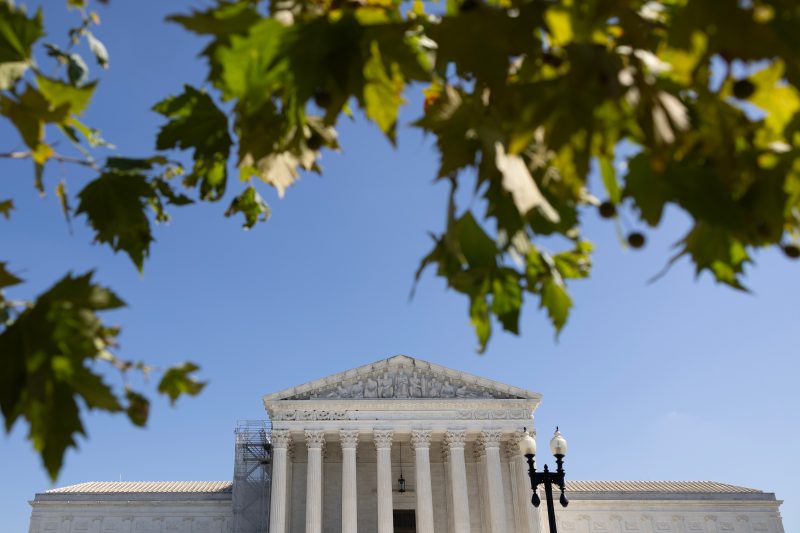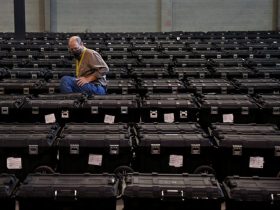A majority of Supreme Court justices on Tuesday seemed skeptical of a broad challenge to the Consumer Financial Protection Bureau that would undermine the existence of the watchdog agency created by Congress 12 years ago.
As attorneys for both sides presented oral arguments, the court’s three liberal justices seemed dismayed at a lower court ruling that said the funding mechanism Congress adopted to ensure the CFPB’s independence violated the Constitution. Some conservative justices who are normally suspicious of the power of federal agencies also voiced concerns, wondering if the challenge went too far.
“I get your point that this is different, that it’s unique, that it’s odd, that [Congress has] never gone this far,” Justice Clarence Thomas said to lawyer Noel J. Francisco, who was defending the challenge. “But that’s … not a constitutional problem.”
U.S. Solicitor General Elizabeth B. Prelogar said the U.S. Court of Appeals for the 5th Circuit was the first court “in the nation’s history” to cast doubt on Congress’s prerogative to decide how to fund an agency. Affirming that ruling could have implications for a host of other regulating agencies — even the Federal Reserve Board — she said, and cast doubt on Social Security and payments to the national debt.
“It would create profound disruption in various economic markets that would hurt the regulated entities themselves,” Prelogar said, pointing to an amicus brief filed on behalf of the government by the Mortgage Bankers Association.
The CFPB case is among several that the Supreme Court will hear this term that challenge the power of federal agencies, long a target of conservatives concerned about what they consider unaccountable government bureaucrats. President Donald Trump prioritized the nomination of judges critical of the power of the administrative state, and those judges have in many cases agreed with challengers in lower courts.
In the case at hand, the three 5th Circuit judges who found the CFPB’s funding unconstitutional were all chosen by Trump. Francisco, representing an association of financial organizations challenging bureau regulations cracking down on payday lenders, was formerly Trump’s top lawyer at the Supreme Court.
The agency at the center of the controversy was created by Congress in response to the 2008 financial crisis, putting scattered federal consumer protections under one structure. Sen. Elizabeth Warren (D-Mass.), who at the time advised the Obama administration, played a lead role in the legislation. In a speech last week defending the agency, Warren said the CFPB has returned $17 billion to consumers.
“The CFPB is under attack because it is good at what it does, and the American people support it,” Warren said.
The Dodd-Frank Wall Street Reform and Consumer Protection Act moved to insulate the CFPB from political influence by making the agency independent from an annual appropriation from Congress. Instead, it is funded from the profits of the Federal Reserve, which itself is funded through bank assessments. The bureau’s budget may not exceed 12 percent of the Fed’s annual operating expenses; so far, the agency has not yet asked for all of its authorized budget in any given year.
But last fall, the trio of 5th Circuit judges considering a case involving a payday lending rule found the funding scheme for the bureau unconstitutional. They said the structure violated the constitutional command requiring congressional appropriation of any “Money … drawn from the Treasury,” adding that the agency’s insulation from congressional committees doubled the violation.
The appeals court vacated the payday lending rule, not because the CFPB lacked authority over the issue but because of the agency’s funding.
“Wherever the line between a constitutionally and unconstitutionally funded agency may be, this unprecedented arrangement crosses it,” the panel said in an opinion written by Judge Cory Wilson. He added, “The constitutional problem is more acute because of the Bureau’s capacious portfolio of authority.”
Wilson noted the panel’s “disagreement” with other courts that had examined and upheld the financial structure. In fact, Prelogar told the Supreme Court that the 5th Circuit’s decision conflicted with one from the U.S. Court of Appeals for the D.C. Circuit, and with decisions from six district courts, each of which said the funding was not unusual.
“Since the founding, Congress has consistently funded agencies through standing appropriations that are not time-limited and that provide significant discretion over how much to spend,” Prelogar said Tuesday, mentioning the Customs Service and the U.S. Mint.
“And Congress has used this kind of appropriation as the default when funding financial regulators,” she said, including the Federal Reserve, Federal Deposit Insurance Corp. and the Federal Housing Finance Agency, among others.
Prelogar faced tough questioning from some of the conservative justices, who wondered what the limits should be on Congress giving up its power of the purse to the executive branch.
“If the president determined it was reasonably necessary to take a trillion dollars, that would satisfy your concern and, on the Appropriations Clause itself, [it] has no upper-limit constraint?” asked Justice Neil M. Gorsuch.
Chief Justice John G. Roberts Jr. noted that Prelogar was being very “aggressive” in defending Congress’s ability to give up its appropriations powers to the executive branch.
But conservative justices Brett M. Kavanaugh and Amy Coney Barrett seemed more skeptical of the breadth of Francisco’s arguments and the lower court’s decision.
Kavanaugh objected to Francisco saying Congress had set up a perpetual funding source for the CFPB. That “implies that it’s entrenched and that a future Congress couldn’t change it,” Kavanaugh said. “But Congress could change it tomorrow, and there’s nothing perpetual or permanent about this.”
Kavanaugh said he thought the CFPB had a “massive constitutional flaw” when it was created, because it placed the agency under the control of a single director who could only be removed by the president for a good reason. But three years ago, he said, the court agreed with challengers about that in a separate case and “fixed” it by enhancing the president’s power.
The liberal justices were supportive of Prelogar and unrelenting in their questioning of Francisco. “You’re just flying in the face of 250 years of history,” Justice Elena Kagan told him. Justice Sonia Sotomayor declared herself at “a total loss” in trying to understand how Congress did not have authority to fund the CFPB the way it did.
At the end, Thomas offered Francisco a chance to focus his argument more sharply. He asked Francisco to “complete this sentence: Funding of the CFPB violates the Appropriations Clause because …?”
“Because Congress has not determined the amount that this agency should be spending,” Francisco said. “Instead, it has delegated to the director the authority to pick his own appropriation, subject only to an upper limit that’s so — so high it’s rarely meaningful.”
The case is Consumer Financial Protection Bureau v. Community Financial Services Association of America.








